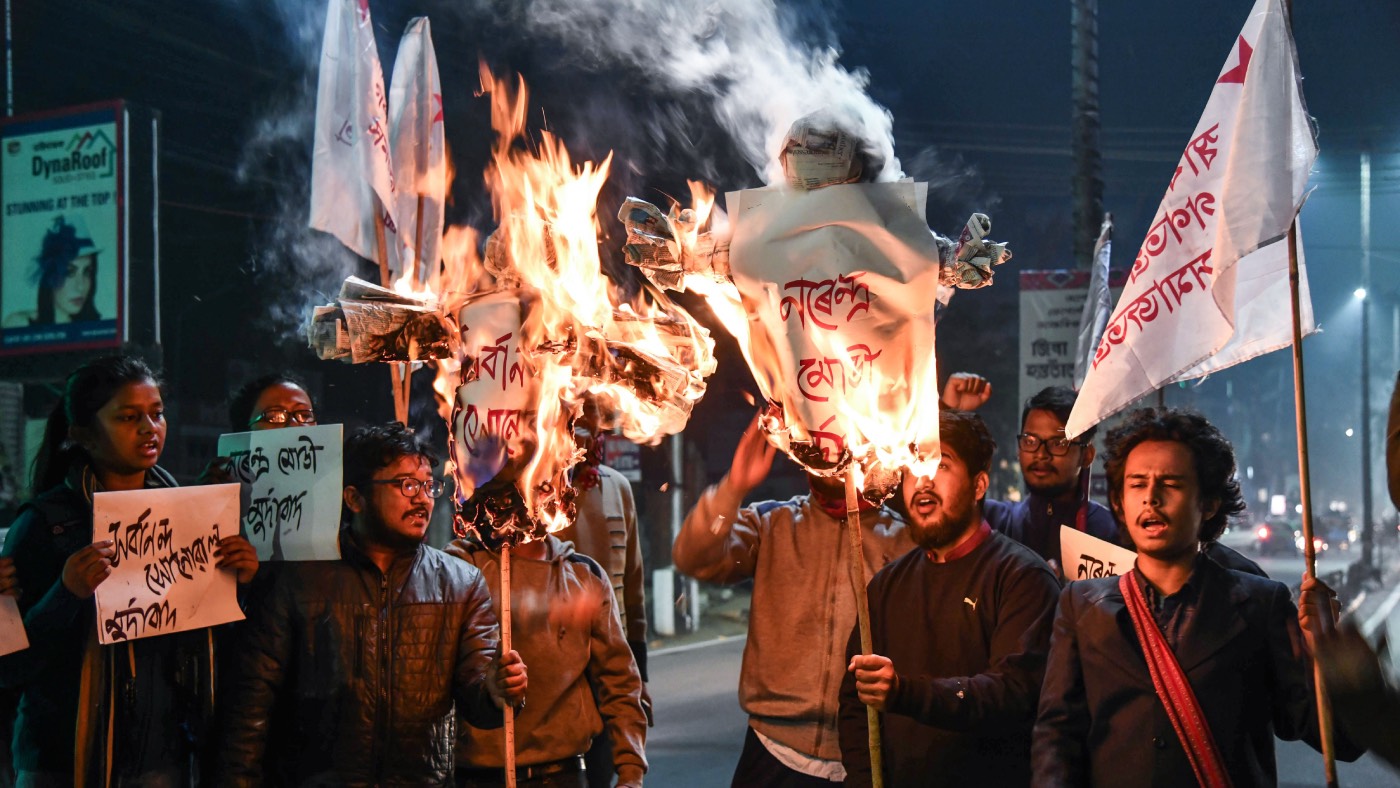Anger as new Indian citizenship bill excludes Muslims
Critics say controversial legislation aims to marginalise Muslims

A free daily email with the biggest news stories of the day – and the best features from TheWeek.com
You are now subscribed
Your newsletter sign-up was successful
India’s lower house has passed a highly controversial law that will grant citizenship to religious minorities from three neighbouring countries, but not Muslims.
The citizenship amendment bill means that Hindus, Sikhs, Buddhists, Jains, Parsis and Christians fleeing persecution in Afghanistan, Bangladesh and Pakistan can be granted citizenship.
However, the bill has proven highly controversial, with critics declaring that it is part of the Hindu nationalist Bharatiya Janata Party’s (BJP) efforts to marginalise Muslims.
The Week
Escape your echo chamber. Get the facts behind the news, plus analysis from multiple perspectives.

Sign up for The Week's Free Newsletters
From our morning news briefing to a weekly Good News Newsletter, get the best of The Week delivered directly to your inbox.
From our morning news briefing to a weekly Good News Newsletter, get the best of The Week delivered directly to your inbox.
Describing himself as “delighted” by the bill’s passage, Indian prime minister, Narendra Modi, tweeted: “This bill is in line with India’s centuries-old ethos of assimilation and belief in humanitarian values.”
But historian Mukul Kesavan told the BBC that while the bill is “couched in the language of refuge and seemingly directed at foreigners... its main purpose is the delegitimisation of Muslim’s citizenship”.
Gautam Bhatia, a lawyer based in Delhi, told the broadcaster that by dividing would-be migrants into Muslims and non-Muslims, the bill “explicitly and blatantly, seeks to enshrine religious discrimination into law, contrary to our long-standing, secular constitutional ethos”.
–––––––––––––––––––––––––––––––For a round-up of the most important stories from around the world - and a concise, refreshing and balanced take on the week’s news agenda - try The Week magazine. Start your trial subscription today –––––––––––––––––––––––––––––––
A free daily email with the biggest news stories of the day – and the best features from TheWeek.com
With opposition intensifying, some 100 scientists and scholars at institutions across India and abroad published a joint letter expressing their “dismay” at the legislation and describing the bill as unconstitutional. The careful exclusion of Muslims would “greatly strain” India’s pluralism, the letter added.
There have already been protests in India’s north-eastern states, where residents are angry at the prospect of an influx of Hindus from neighbouring Bangladesh. In some demonstrations protesters set fire to tyres, while tribal groups staged protests in Tripura.
However, senior BJP leader Ram Madhav was unmoved by the opposition, insisting that “no country in the world accepts illegal migration”.
“For all others about whom the bleeding hearts’ are complaining, Indian citizenship laws are there. Naturalised citizenship is an option for others who legally claim Indian citizenship. All other illegal [immigrants] will be infiltrators.”
-
 The EU’s war on fast fashion
The EU’s war on fast fashionIn the Spotlight Bloc launches investigation into Shein over sale of weapons and ‘childlike’ sex dolls, alongside efforts to tax e-commerce giants and combat textile waste
-
 How to Get to Heaven from Belfast: a ‘highly entertaining ride’
How to Get to Heaven from Belfast: a ‘highly entertaining ride’The Week Recommends Mystery-comedy from the creator of Derry Girls should be ‘your new binge-watch’
-
 The 8 best TV shows of the 1960s
The 8 best TV shows of the 1960sThe standout shows of this decade take viewers from outer space to the Wild West
-
 Epstein files topple law CEO, roil UK government
Epstein files topple law CEO, roil UK governmentSpeed Read Peter Mandelson, Britain’s former ambassador to the US, is caught up in the scandal
-
 Iran and US prepare to meet after skirmishes
Iran and US prepare to meet after skirmishesSpeed Read The incident comes amid heightened tensions in the Middle East
-
 EU and India clinch trade pact amid US tariff war
EU and India clinch trade pact amid US tariff warSpeed Read The agreement will slash tariffs on most goods over the next decade
-
 Israel retrieves final hostage’s body from Gaza
Israel retrieves final hostage’s body from GazaSpeed Read The 24-year-old police officer was killed during the initial Hamas attack
-
 China’s Xi targets top general in growing purge
China’s Xi targets top general in growing purgeSpeed Read Zhang Youxia is being investigated over ‘grave violations’ of the law
-
 Panama and Canada are negotiating over a crucial copper mine
Panama and Canada are negotiating over a crucial copper mineIn the Spotlight Panama is set to make a final decision on the mine this summer
-
 Why Greenland’s natural resources are nearly impossible to mine
Why Greenland’s natural resources are nearly impossible to mineThe Explainer The country’s natural landscape makes the task extremely difficult
-
 Iran cuts internet as protests escalate
Iran cuts internet as protests escalateSpeed Reada Government buildings across the country have been set on fire